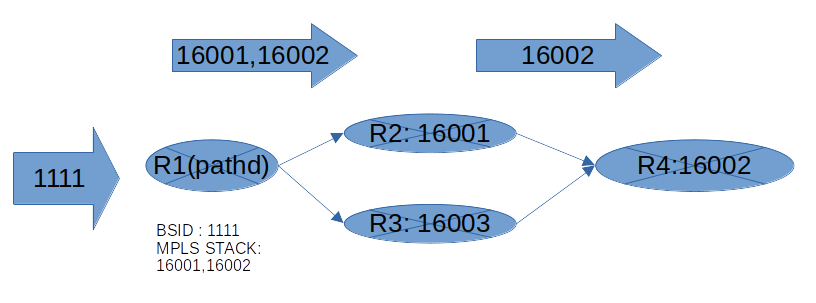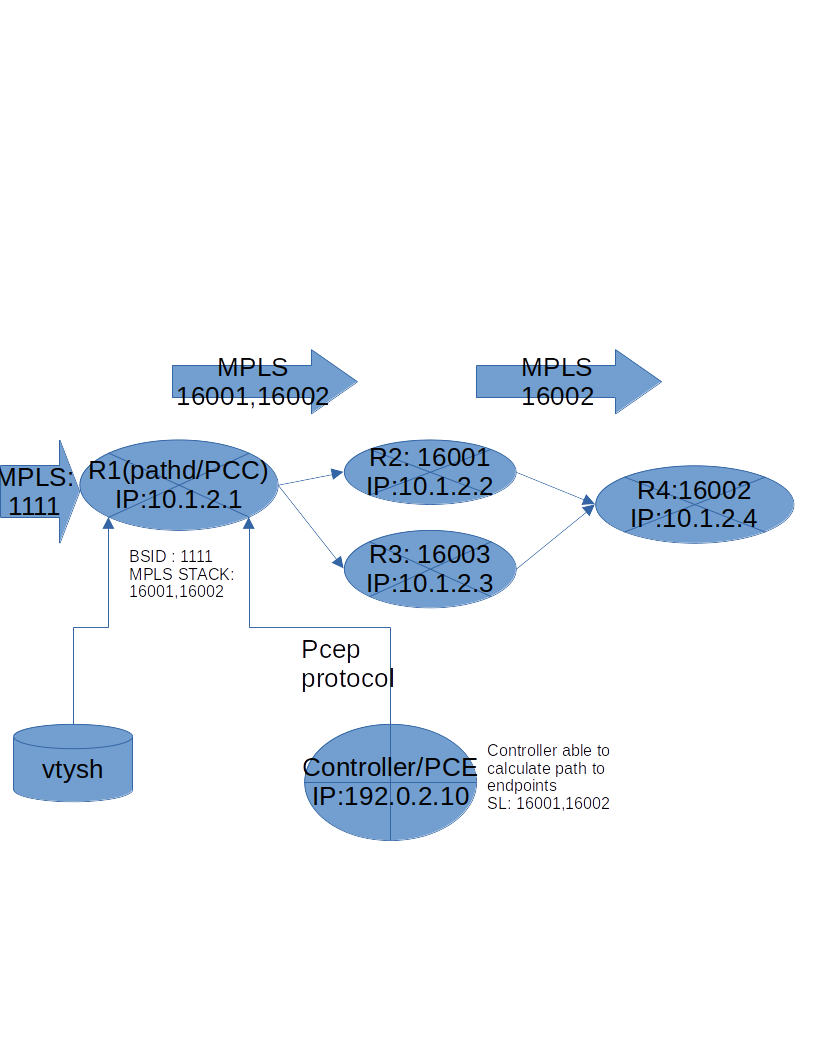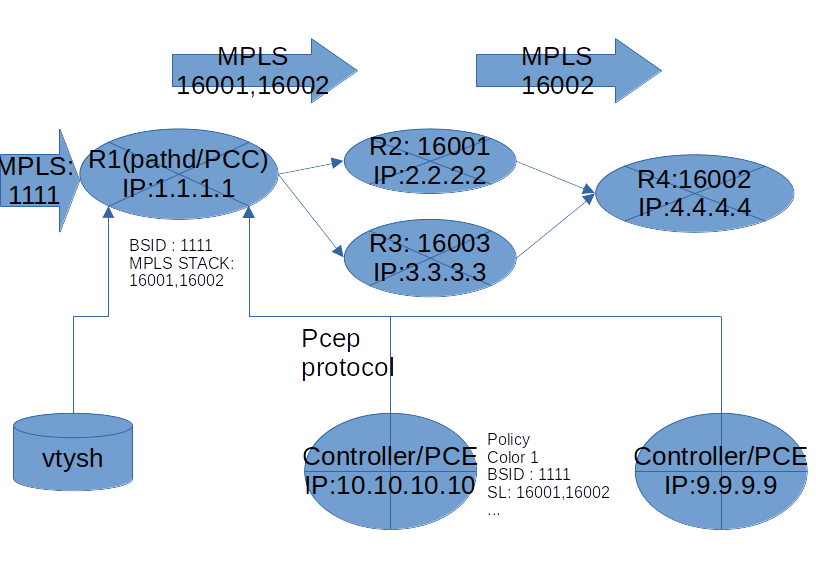PATH
PATH is a daemon that handles the installation and deletion of Segment Routing (SR) Policies. Based on MPLS (This means that your OS of choice must support MPLS), SR add a stack of MPLS labels to ingress packets so these packets are egress through the desired path.

The SR policies and Segment Lists can be configured either locally by means of vtysh or centralized based on a SDN controller (ODL, Cisco, …) communicating using the PCEP protocol (RFC 5440).
Configuration
Explicit Segment Lists
This is the simplest way of configuration, no remote PCE is necessary.
In order to create a config that match the graphics used in this documentation,
we will create a segment list (SL) called SL1 with an element for each hop and
that element will be assigned a MPLS label.
Then the SL1 will be used in the policy example1, please note also the
preference as in the case of multiple segment list it will be used with the
criteria of bigger number more preference.
Let see now the final configuration that match the graphics shown above.
segment-routing
traffic-eng
segment-list SL1
index 10 mpls label 16001
index 20 mpls label 16002
!
policy color 1 endpoint 192.0.2.4
name example1
binding-sid 1111
candidate-path preference 100 name CP1 explicit segment-list SL1
Explicit Segment Lists and Traffic Engineering Database (TED)
Sometimes is difficult to know the values of MPLS labels (adjacency changes,…). Based on the support of IS-IS or OSPF we can activate TED support what will allow pathd to resolve MPLS based in different types of segments (:rfc: draft-ietf-spring-segment-routing-policy-07). The supported types are Type C (prefix and local interface), Type E (prefix and algorithm), Type F (a pair of IP’s). So the configuration would change to this
segment-routing
traffic-eng
mpls-te on
mpls-te import ospfv2
segment-list SL1
index 10 nai prefix 10.1.2.1/32 iface 1
index 20 nai adjacency 10.1.20.1 10.1.20.2
!
policy color 1 endpoint 192.0.2.4
name example1
binding-sid 1111
candidate-path preference 100 name CP1 explicit segment-list SL1
In this case no MPLS are provided but the pathd TED support will resolve the configuration provided to corresponding MPLS labels.
Note
Please note the mpls-te configuration added that activate the TED
support and points to ospfv2 so
the ospfv2 (Traffic Engineering) daemon must be also
running and configure to export TED information.
Note
It would be the same for isis (Traffic Engineering) but in the moment of writting it’s not fully tested.
Dynamic Segment Lists
One of the useful options to configure is the creation of policies with the dynamic option. In this case based on a given endpoint the SL will be ,first calculated, and then sended by means of PCEP protocol by the configured PCE.
traffic-eng
!
pcep
!
pce PCE1
address ip 192.0.2.10
!
pcc
peer PCE1 precedence 10
!
policy color 1 endpoint 192.0.2.4
name example
binding-sid 1111
candidate-path preference 100 name CP2 dynamic
Note
Please note the configuration for the remote pce which allows pathd to connect to the given PCE and act as a PCC (PCEP Client)
Note
If the TED support feature is active, the data obtained from PCE will be validated, so in a SL from PCEP/PCE the IP and MPLS will be checked against local TED obtained and built from the igp configured in that case.

Pce Initiated
We can step forward in the use of our controller not only by asking to calculate paths to an endpoint but also to create the whole policies in the controller and obtain those by means of the PCEP protocol.
traffic-eng
!
pcep
!
pce PCE1
address ip 192.0.2.10
pce-initiated
!
pce PCE2
address ip 192.0.2.9
pce-initiated
!
pcc
peer PCE1 precedence 10
peer PCE2 precedence 20
!
Note
Now there is no locally created policies in the config as they will
be obtain from the configured pce.
Please check command show sr-te policy in vtysh to see
the obtained policies.
Note
Another interesting command is show mpls table
to check the installed mpls configuration based in those obtained
policies.
Note
SR Policies could be a mix of local, remote obtained from PCE and delegated to a PCE (but while testing Pce Initiated with Cisco PCE, happens that controller sends PCE initiated delete commands to delete the locally created configuration related to that PCE).

Starting
Default configuration file for pathd is pathd.conf. The typical
location of pathd.conf is /etc/frr/pathd.conf.
If the user is using integrated config, then pathd.conf need not be
present and the frr.conf is read instead.
PATH supports all the common FRR daemon start options which are documented elsewhere.
PCEP Support
A pceplib is included in the frr source tree and build by default.
To start pathd with pcep support the extra parameter -M pathd_pcep should be passed to the pathd daemon.
An example of command line with pcep module could be this
pathd -u root -g root -f pathd.conf -z /tmp/zebra-demo1.sock --vty_socket=/var/run/demo1.vty -i /tmp/pathd-demo1.pid -M frr/modules/pathd_pcep.so --log file:/tmp/kk.txt
Pathd Configuration
Example:
debug pathd pcep basic
segment-routing
traffic-eng
mpls-te on
mpls-te import ospfv2
segment-list SL1
index 10 mpls label 16010
index 20 mpls label 16030
!
segment-list SL2
index 10 nai prefix 10.1.2.1/32 iface 1
index 20 nai adjacency 10.1.20.1 10.1.20.2
index 30 nai prefix 10.10.10.5/32 algorithm 0
index 40 mpls label 18001
!
policy color 1 endpoint 192.0.2.1
name default
binding-sid 4000
candidate-path preference 100 name CP1 explicit segment-list SL1
candidate-path preference 200 name CP2 dynamic
affinity include-any 0x000000FF
bandwidth 100000
metric bound msd 16 required
metric te 10
objective-function mcp required
!
pcep
pce-config GROUP1
source-address 192.0.2.1
tcp-md5-auth secret
timer keep-alive 30
!
pce PCE1
config GROUP1
address ip 192.0.2.10
!
pce PCE2
config GROUP1
address ip 192.0.2.9
!
pcc
peer PCE1 precedence 10
peer PCE2 precedence 20
!
!
!
!
Configuration Commands
- segment-routing
Configure segment routing.
- traffic-eng
Configure segment routing traffic engineering.
- mpls-te <on|off>
Activate/Deactivate use of internal Traffic Engineering Database
- mpls-te import <ospfv2|ospfv3|isis>
Load data from the selected igp
- segment-list NAME
Delete or start a segment list definition.
- index INDEX mpls label LABEL
- index INDEX nai adjacency A.B.C.D A.B.C.D
- index INDEX nai prefix A.B.C.D/M algorithm <0|1>
- index INDEX nai prefix A.B.C.D/M iface (0-65535)
Delete or specify a segment in a segment list definition.
- policy color COLOR endpoint ENDPOINT
Delete or start a policy definition.
- name NAME
Specify the policy name.
- binding-sid LABEL
Specify the policy SID.
- candidate-path preference PREFERENCE name NAME explicit segment-list SEGMENT-LIST-NAME
Delete or define an explicit candidate path.
- candidate-path preference PREFERENCE name NAME dynamic
Delete or start a dynamic candidate path definition.
- affinity <exclude-any|include-any|include-all> BITPATTERN
Delete or specify an affinity constraint for a dynamic candidate path.
- bandwidth BANDWIDTH [required]
Delete or specify a bandwidth constraint for a dynamic candidate path.
- metric [bound] METRIC VALUE [required] [computed]
Delete or specify a metric constraint for a dynamic candidate path.
- The possible metrics are:
igp: IGP metric
te: TE metric
hc: Hop Counts
abc: Aggregate bandwidth consumption
mll: Load of the most loaded link
igp: Cumulative IGP cost
cte: Cumulative TE cost
igp: P2MP IGP metric
pte: P2MP TE metric
phc: P2MP hop count metric
msd: Segment-ID (SID) Depth
pd: Path Delay metric
pdv: Path Delay Variation metric
pl: Path Loss metric
ppd: P2MP Path Delay metric
pdv: P2MP Path Delay variation metric
ppl: P2MP Path Loss metric
nap: Number of adaptations on a path
nlp: Number of layers on a path
dc: Domain Count metric
bnc: Border Node Count metric
- objective-function OBJFUN1 [required]
Delete or specify a PCEP objective function constraint for a dynamic candidate path.
- The possible functions are:
mcp: Minimum Cost Path [RFC5541]
mlp: Minimum Load Path [RFC5541]
mbp: Maximum residual Bandwidth Path [RFC5541]
mbc: Minimize aggregate Bandwidth Consumption [RFC5541]
mll: Minimize the Load of the most loaded Link [RFC5541]
mcc: Minimize the Cumulative Cost of a set of paths [RFC5541]
spt: Shortest Path Tree [RFC8306]
mct: Minimum Cost Tree [RFC8306]
mplp: Minimum Packet Loss Path [RFC8233]
mup: Maximum Under-Utilized Path [RFC8233]
mrup: Maximum Reserved Under-Utilized Path [RFC8233]
mtd: Minimize the number of Transit Domains [RFC8685]
mbn: Minimize the number of Border Nodes [RFC8685]
mctd: Minimize the number of Common Transit Domains [RFC8685]
msl: Minimize the number of Shared Links [RFC8800]
mss: Minimize the number of Shared SRLGs [RFC8800]
msn: Minimize the number of Shared Nodes [RFC8800]
- debug pathd pcep [basic|path|message|pceplib]
Enable or disable debugging for the pcep module:
basic: Enable basic PCEP logging
path: Log the path structures
message: Log the PCEP messages
pceplib: Enable pceplib logging
- pcep
Configure PCEP support.
- pce-config NAME
Define a shared PCE configuration that can be used in multiple PCE declarations.
- pce NAME
Define or delete a PCE definition.
- config WORD
Select a shared configuration. If not defined, the default configuration will be used.
- address <ip A.B.C.D | ipv6 X:X::X:X> [port (1024-65535)]
Define the address and port of the PCE.
If not specified, the port is the standard PCEP port 4189.
This should be specified in the PCC peer definition.
- source-address [ip A.B.C.D | ipv6 X:X::X:X] [port PORT]
Define the address and/or port of the PCC as seen by the PCE. This can be used in a configuration group or a PCC peer declaration.
If not specified, the source address will be the router identifier selected by zebra, and the port will be the standard PCEP port 4189.
This can be specified in either the PCC peer definition or in a configuration group.
- tcp-md5-auth WORD
Enable TCP MD5 security with the given secret.
This can be specified in either the PCC peer definition or in a configuration group.
- sr-draft07
Specify if a PCE only support segment routing draft 7, this flag will limit the PCC behavior to this draft.
This can be specified in either the PCC peer definition or in a configuration group.
- pce-initiated
Specify if PCE-initiated LSP should be allowed for this PCE.
This can be specified in either the PCC peer definition or in a configuration group.
- timer [keep-alive (1-63)] [min-peer-keep-alive (1-255)] [max-peer-keep-alive (1-255)] [dead-timer (4-255)] [min-peer-dead-timer (4-255)] [max-peer-dead-timer (4-255)] [pcep-request (1-120)] [session-timeout-interval (1-120)] [delegation-timeout (1-60)]
Specify the PCEP timers.
This can be specified in either the PCC peer definition or in a configuration group.
- pcc
Disable or start the definition of a PCC.
- msd (1-32)
Specify the maximum SID depth in a PCC definition.
- no msd [(1-32)]
Default the maximum SID depth to 4.
- peer WORD [precedence (1-255)]
Specify a peer and its precedence in a PCC definition.
Debugging
- debug pathd policy
Enable or disable Pathd policy information.
Introspection Commands
- show sr-te policy [detail]
Display the segment routing policies.
router# show sr-te policy
Endpoint Color Name BSID Status
------------------------------------------
192.0.2.1 1 default 4000 Active
router# show sr-te policy detail
Endpoint: 192.0.2.1 Color: 1 Name: LOW_DELAY BSID: 4000 Status: Active
Preference: 100 Name: cand1 Type: explicit Segment-List: sl1 Protocol-Origin: Local
* Preference: 200 Name: cand1 Type: dynamic Segment-List: 32453452 Protocol-Origin: PCEP
The asterisk (*) marks the best, e.g. active, candidate path. Note that for segment-lists which are retrieved via PCEP a random number based name is generated.
- show sr-te pcep counters
Display the counters from pceplib.
- show sr-te pcep pce-config [NAME]
Display a shared configuration. if no name is specified, the default configuration will be displayed.
- show sr-te pcep pcc
Display PCC information.
- show sr-te pcep session [NAME] [json]
Display the information of a PCEP session, if not name is specified all the sessions will be displayed.
Utility Commands
- clear sr-te pcep session [NAME]
Reset the pcep session by disconnecting from the PCE and performing the normal reconnection process. No configuration is changed.
Usage with BGP route-maps
It is possible to steer traffic ‘into’ a segment routing policy for routes learned through BGP using route-maps:
route-map SET_SR_POLICY permit 10
set sr-te color 1
!
router bgp 1
bgp router-id 192.0.2.2
neighbor 192.0.2.1 remote-as 1
neighbor 192.0.2.1 update-source lo
!
address-family ipv4 unicast
neighbor 192.0.2.1 next-hop-self
neighbor 192.0.2.1 route-map SET_SR_POLICY in
redistribute static
exit-address-family
!
!
In this case, the SR Policy with color 1 and endpoint 192.0.2.1 is selected.
Sample configuration
! Default pathd configuration sample
!
password frr
log stdout
segment-routing
traffic-eng
segment-list test1
index 10 mpls label 123
index 20 mpls label 456
!
segment-list test2
index 10 mpls label 321
index 20 mpls label 654
!
policy color 1 endpoint 192.0.2.1
name one
binding-sid 100
candidate-path preference 100 name test1 explicit segment-list test1
candidate-path preference 200 name test2 explicit segment-list test2
!
policy color 2 endpoint 192.0.2.2
name two
binding-sid 101
candidate-path preference 100 name def explicit segment-list test2
candidate-path preference 200 name dyn dynamic
bandwidth 12345
metric bound abc 16 required
metric te 10
!
!
pcep
pcc-peer PCE1
address ip 127.0.0.1
sr-draft07
!
pcc
peer PCE1
!
!
!